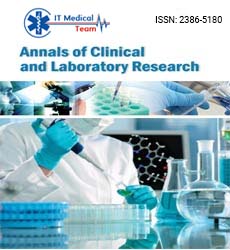
Annals of Clinical and Laboratory Research
- ISSN: 2386-5180
-
Journal h-index: 19
- Journal CiteScore: 5.42
- Journal Impact Factor: 4.64
- Average acceptance to publication time (5-7 days)
-
Average article processing time (30-45 days)
Less than 5 volumes 30 days
8 - 9 volumes 40 days
10 and more volumes 45 days





